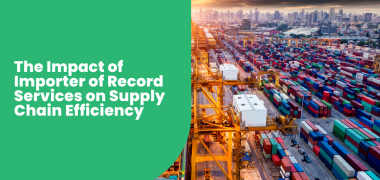In the dynamic world of global trade, businesses constantly seek ways to streamline operations, reduce costs, and enhance supply chain efficiency. One critical aspect of international commerce is ensuring compliance with the myriad regulations of different countries. This is where the Importer of Record (IOR) services come into play. In this blog post, we will explore the impact of IOR services on supply chain efficiency, examining how they can enhance operational effectiveness, mitigate risks, and contribute to the overall success of global businesses.
Understanding Importer of Record (IOR) Services
What is an Importer of Record?
An Importer of Record is a person or entity responsible for ensuring that imported goods comply with local laws and regulations. This role involves handling documentation, paying duties and taxes, and ensuring that all import activities adhere to the legal requirements of the destination country. The IOR takes on the legal responsibility for the imported goods, acting as the official importer for customs purposes.
Key Responsibilities of an IOR
- Customs Compliance: Ensuring that all imported goods meet the regulatory standards of the destination country.
- Documentation Management: Handling the necessary paperwork, including import licenses, permits, and certificates.
- Payment of Duties and Taxes: Calculating and paying applicable duties, taxes, and fees.
- Record Keeping: Maintaining detailed records of all import transactions for audit purposes.
Enhancing Supply Chain Efficiency with IOR Services
Streamlined Customs Clearance
One of the most significant impacts of IOR services on supply chain efficiency is the streamlining of customs clearance processes. Efficient customs clearance is crucial for avoiding delays and ensuring that goods reach their destination on time. IOR service providers have in-depth knowledge of customs regulations and procedures, enabling them to navigate the complexities of international trade with ease.
Benefits:
- Reduced Delays: Faster clearance times mean that goods spend less time in customs, reducing lead times and improving delivery schedules.
- Minimized Errors: Professional IOR services reduce the risk of errors in documentation and compliance, which can otherwise lead to costly delays and penalties.
Compliance with International Regulations
International trade is governed by a complex web of regulations that vary from country to country. Non-compliance with these regulations can result in severe penalties, confiscation of goods, and damage to a company’s reputation. IOR services ensure that all imports comply with local laws, mitigating the risk of non-compliance.
Benefits:
- Risk Mitigation: By ensuring compliance with all relevant regulations, IOR services help businesses avoid legal issues and financial penalties.
- Peace of Mind: Businesses can focus on their core operations, confident that their imports are handled by experts who understand the regulatory landscape.
Cost Savings
IOR services can lead to significant cost savings in several ways. By ensuring accurate and timely payment of duties and taxes, businesses can avoid fines and penalties. Additionally, efficient customs clearance reduces the need for expensive warehousing and storage of goods while they await clearance.
Benefits:
- Reduced Penalties: Accurate compliance with customs regulations means fewer fines and penalties for businesses.
- Lower Storage Costs: Faster customs clearance reduces the need for prolonged storage of goods, lowering warehousing costs.
Improved Supply Chain Visibility
IOR service providers often offer advanced tracking and reporting tools that enhance supply chain visibility. These tools enable businesses to monitor the status of their shipments in real time, providing valuable insights into the movement of goods and potential bottlenecks.
Benefits:
- Enhanced Tracking: Real-time tracking of shipments allows businesses to keep customers informed and manage expectations.
- Data-Driven Decisions: Access to detailed reports and analytics enables businesses to make informed decisions about their supply chain operations.
Case Studies: Real-World Impact of IOR Services
Case Study 1: Technology Sector
A global technology company was facing significant delays in getting its products through customs in several countries. These delays were impacting their ability to meet customer demand and resulting in increased storage costs. By partnering with an IOR service provider, the company streamlined its customs clearance process, reducing lead times by 40%. This improvement not only enhanced customer satisfaction but also resulted in substantial cost savings.
Case Study 2: Pharmaceutical Industry
A pharmaceutical company needed to ensure strict compliance with import regulations due to the sensitive nature of its products. Any delays or non-compliance could lead to severe consequences, including product spoilage. The company engaged an IOR service provider to manage its imports, ensuring that all regulatory requirements were met. As a result, the company achieved a 30% reduction in customs-related delays, ensuring that their products reached patients on time and in optimal condition.
Challenges and Considerations in Implementing IOR Services
Selecting the Right IOR Service Provider
Choosing the right IOR service provider is crucial for maximizing the benefits of these services. Businesses should consider factors such as the provider’s expertise in their industry, geographic coverage, and track record of compliance.
Key Considerations:
- Industry Expertise: Ensure the provider has experience in handling imports specific to your industry.
- Geographic Coverage: Choose a provider with a strong presence in the countries where you operate.
- Compliance Record: Review the provider’s history of compliance and any past issues.
Balancing Cost and Quality
While cost savings are a significant benefit of IOR services, businesses must balance cost considerations with the quality of service. Opting for the cheapest provider may result in subpar service and increased risk of non-compliance.
Key Considerations:
- Value for Money: Assess the overall value provided by the service, not just the cost.
- Service Quality: Ensure that the provider offers reliable and efficient services.
Adapting to Changing Regulations
International trade regulations are constantly evolving, and businesses must stay abreast of these changes to ensure ongoing compliance. IOR service providers can help businesses navigate these changes, but companies should also invest in ongoing training and education for their internal teams.
Key Considerations:
- Regulatory Updates: Choose a provider that stays up-to-date with the latest regulatory changes.
- Internal Training: Invest in training for your team to ensure they understand the importance of compliance.
Future Trends in IOR Services
Technology Integration
The future of IOR services will likely see increased integration of technology to enhance efficiency and visibility. Advanced tracking systems, blockchain for secure documentation, and AI for predictive analytics are some of the technologies that will shape the future of IOR services.
Key Trends:
- Blockchain: Secure and transparent documentation of import transactions.
- AI and Analytics: Predictive analytics for better decision-making and risk management.
Sustainability and Ethical Sourcing
As global trade continues to grow, there is an increasing focus on sustainability and ethical sourcing. IOR service providers will need to ensure that imported goods meet environmental and ethical standards, aligning with the growing demand for sustainable practices.
Key Trends:
- Sustainable Practices: Ensuring that imports adhere to environmental regulations and ethical sourcing standards.
- Corporate Responsibility: Aligning import practices with broader corporate social responsibility (CSR) goals.
Conclusion
In conclusion, Importer of Record services play a vital role in enhancing supply chain efficiency. By streamlining customs clearance, ensuring compliance with international regulations, and reducing costs, IOR services enable businesses to operate more effectively in the global marketplace. As technology continues to advance and sustainability becomes a key focus, the role of IOR services will only become more critical. Businesses that leverage these services will be well-positioned to navigate the complexities of international trade and achieve long-term success.
By understanding the impact of IOR services on supply chain efficiency and implementing best practices, businesses can enhance their operational effectiveness, reduce risks, and drive growth in the competitive world of global trade.




